APFNet supports Thailand for better urban forests and forest carbon measurement – terminal evaluation of two projects in Thailand successfully concluded
Urban forestry has attracted considerable attention in recent years as a significant approach for addressing various urban challenges, while carbon estimation of the forest ecosystem is an essential foundation for assessing the contribution of forests in mitigating climate change impacts. In line with the forestry strategy of Thailand on addressing the aforementioned concerns, two projects were launched and funded by APFNet respectively in 2013 and 2017: “Strengthening Urban Forestry Demonstration Site of Bang Kachao (Thailand) for Biodiversity Conservation and Natural Learning Center [2012P1-THA]” and “To Demonstrate the Development and Application of Standing-Tree Carbon Equations to Improve the Accuracy of Forest-Cover Carbon Stock Estimates in Thailand [2015P6-THA]”.
From 1 to 5 April 2019, the Terminal Evaluation of these two projects was successfully conducted by an independent evaluation team that aimed to assess project performance, outcomes and impacts stemming from project implementation.
Bang Kachao, an island located in Samut Prakarn Province which is approximately 10 km from the centre of Bangkok is an unique ecosystem that has a combination of fresh, salt and brackish water; it has gained a reputation among the public for its natural beauty and well-preserved traditional and healthy way of local life. Since 2013, APFNet has worked with Royal Forest Department (RFD) in this area through the urban forestry demonstration project [2015P6-THA], to further enhance the biodiversity conservation of Bangkaochao and demonstrate urban forestry development with the full involvement of local communities. Initial findings of the project’s terminal evaluation were positive. To further promote ecotourism in Bang Kachao, the Biodiversity Conservation and Natural Learning Centre has been established as an activity base for the community to organize field trips for children and organizations as well as the community eco-tourism programme for Bangkok day trippers and visitors. It will also enhance the capacity and knowledge of grassroots communities on forest resource management and utilization and raise local awareness on the protection of forests and biological diversity.
From 1 to 5 April 2019, the Terminal Evaluation of these two projects was successfully conducted by an independent evaluation team that aimed to assess project performance, outcomes and impacts stemming from project implementation.
Bang Kachao, an island located in Samut Prakarn Province which is approximately 10 km from the centre of Bangkok is an unique ecosystem that has a combination of fresh, salt and brackish water; it has gained a reputation among the public for its natural beauty and well-preserved traditional and healthy way of local life. Since 2013, APFNet has worked with Royal Forest Department (RFD) in this area through the urban forestry demonstration project [2015P6-THA], to further enhance the biodiversity conservation of Bangkaochao and demonstrate urban forestry development with the full involvement of local communities. Initial findings of the project’s terminal evaluation were positive. To further promote ecotourism in Bang Kachao, the Biodiversity Conservation and Natural Learning Centre has been established as an activity base for the community to organize field trips for children and organizations as well as the community eco-tourism programme for Bangkok day trippers and visitors. It will also enhance the capacity and knowledge of grassroots communities on forest resource management and utilization and raise local awareness on the protection of forests and biological diversity.
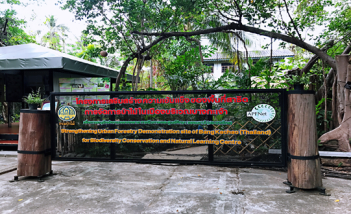
The project signboard in the Pa Ket Community.
Through the project, the women’s working group of Suan Pa Ket Nom Klao Urban Community Forest – the first urban forest community in Thailand, has worked closely with the project and benefited as such. Their awareness of biodiversity conservation and ecotourism promotion as well as their capacity on forest resource management and utilization has increased through project implementation. Additionally, the production of ecotourism products by utilizing natural resources was highly appreciated by the evaluation team.
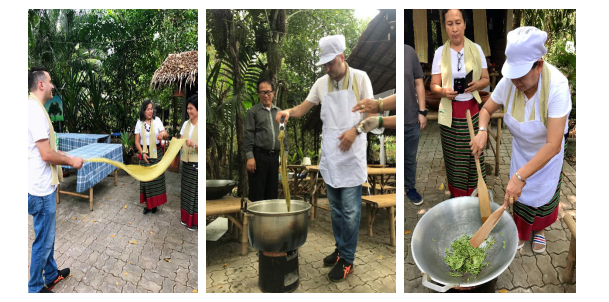
Creating ecotourism products from natural resources.
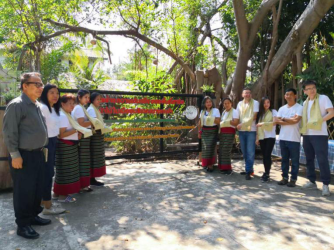
The Pa Ket Community and Project Management Team.
Another project related to carbon stock estimates [2015P6-THA] supported by APFNet in Thailand, aimed to address uncertainty in the accuracy of forest carbon stock estimation in Thailand. Since 2017, with cooperation from Kasetsart University’s Faculty of Forestry (KUFF), via scientifically rigorous experimentation and measurement, the project has developed standing-tree carbon equations of key forest species in Northern Thailand. A project terminal evaluation conducted by three experienced researchers in the field on 4 April well recognized the achievements of the project.
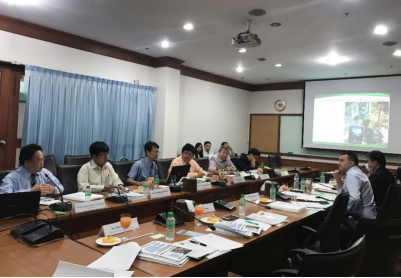
Discussion meeting with the Project Management Teamon the construction of standing-tree carbon equations.
The established high accuracy of forest carbon stock estimation models is considered to be an essential foundation for the development of forest-cover carbon stock mapping in Thailand. The potential scaling up of the project methodologies was suggested. Moreover, the project was also encouraged to provide a basis for decision-making on national forest carbon estimation action plans.
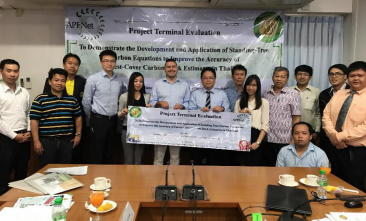
Professor Dr Khwanchai, the ProjectDirector and other PMT member of KUFF.
In general, both projects have achieved the expected goals, and provided a good demonstration for future project development. Final evaluation reports of the two projects will be released soon.




